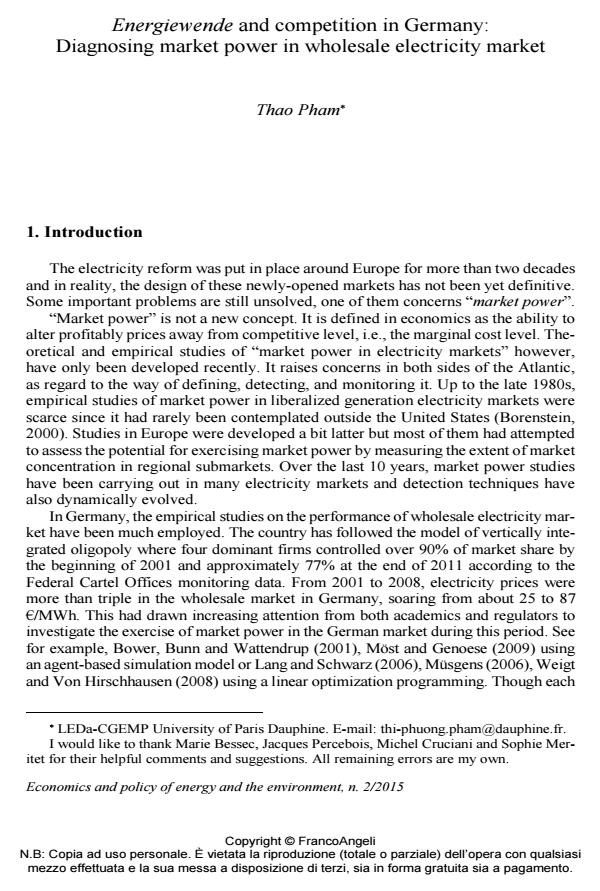Energiewende and competition in Germany: Diagnosing market power in wholesale electricity market
Journal title ECONOMICS AND POLICY OF ENERGY AND THE ENVIRONMENT
Author/s Thao Pham
Publishing Year 2016 Issue 2015/2
Language English Pages 21 P. 29-49 File size 1094 KB
DOI 10.3280/EFE2015-002004
DOI is like a bar code for intellectual property: to have more infomation
click here
Below, you can see the article first page
If you want to buy this article in PDF format, you can do it, following the instructions to buy download credits

FrancoAngeli is member of Publishers International Linking Association, Inc (PILA), a not-for-profit association which run the CrossRef service enabling links to and from online scholarly content.
German power market has undergone many fundamental changes in 2011 following the Fukushima nuclear accident (March 2011). Prices on wholesale electricity market are at the highest level since mid-2009. The purpose of this chapter is to identify whether market power is responsible for this increase. Following the method of linear programming as commonly used in the literature of electricity market modelling, we simulate a competitive benchmark for German wholesale market taking into account power plant characteristics, fuel and CO2-allowance prices and renewables power generation. On the basis of the difference between modeled marginal costs and observed market prices, we estimate the price-cost markups, or the Lerner Indexes across hours. .
Keywords: Electricity, market power, Germany, oligopolistic market
Jel codes: L13, L94, D43
- Market Power Issues in Liberalized Wholesale Electricity Markets: A Review of the Literature with a Look into the Future Thao Pham, in Revue d'économie politique /2019 pp.325
DOI: 10.3917/redp.293.0325 - Artificial Intelligence and Renewables Towards an Energy Transition S. H. Oudjana, Rabie Zine, Mustafa Mosbah, Abdelouahab Khattara, Salem. Arif, pp.252 (ISBN:978-3-030-63845-0)
- A review of market power‐mitigation mechanisms in electricity markets Xueshan Lin, Beibei Wang, Zhongming Xiang, Yaxian Zheng, in Energy Conversion and Economics /2022 pp.304
DOI: 10.1049/enc2.12067 - Smart Energy Empowerment in Smart and Resilient Cities Mustafa Mosbah, Rabie Zine, Samir Hamid-Oudjana, Salem Arif, pp.566 (ISBN:978-3-030-37206-4)
Thao Pham, Energiewende and competition in Germany: Diagnosing market power in wholesale electricity market in "ECONOMICS AND POLICY OF ENERGY AND THE ENVIRONMENT" 2/2015, pp 29-49, DOI: 10.3280/EFE2015-002004